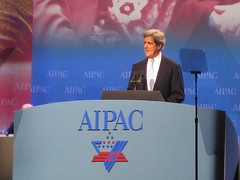Biden and Kerry: Israel and America Inextricably Linked
In the wake of backlash over President Obama's decision to have diplomatic talks with Iran, high level Democrats are assuring the public that the U.S. commitment to Israel is as strong as ever.
But, "One enduring essential principle that will not change--United States support for Israel,” said Vice President Joe Biden to a standing ovation of more than 6,000 people at the American Israeli Public Affairs Committee's annual convention.
“The path we have been on in recent years has not produced peace and security for Israel and Palestinians, nor will they produce these results,” Biden said. “Because peace has not occurred, does not mean that it cannot occur."
U.S. Sen. John Kerry (D-Mass.), who also spoke at the event, supports the Obama Administration’s policy with Israel. “You can count on Vice President Biden and President Obama in the future,” he said.
Kerry tried to calm fears about Obama’s decision to engage in open discussions with Iran because he believed that the previous administration’s strategy with the Middle Eastern country failed, and that a change is warranted. But, if diplomacy fails, hardline sanctions will be sure to follow, Kerry said.
Since December 2008, foreign criticism of Israel reached new levels. Israel decided to retaliate against Hamas by launching a full military incursion into the Gaza Strip. The Israeli Government maintains that the action was an attempt to halt hundreds of rockets that are launched over Israeli borders by militant groups in neighboring countries.
“I heard of (Israeli) children in the second grade who had spent literally everyday of their lives never 15 seconds from danger/ Fifteen seconds... No child should live that way,” said Kerry to the audience.
Kerry is the chairman of the Senate Foreign Relations Committee and pledged to do everything in his power “to ensure that the $30 billion in security assistance that Congress pledged to Israel is delivered in full.”
Kerry and Biden presented a challenge to Israel: that the country needs to work toward a workable, long lasting and sustainable peace.
Biden believes that any peace is a “show-me plan,” that each side must make efforts to demonstrate their dedication for the process to continue.
Biden said that the building of Israeli settlements must be stopped and that Palestinians must be given freedom of movement so the young people see hope, and do not join Hamas.
But peace must be sought from Paestinians and Israelis. “You cannot make peace out of one side of their mouth and preach hate out of another,” said Kerry, adding that Palestinian geography books should be realistic by including Israel on the map.




 Tuesday, May 5, 2009 at 7:55PM
Tuesday, May 5, 2009 at 7:55PM
Clinton: Iran Has Refused To 'Live Up To Its Responsibilities'
Secretary of State Hillary Clinton told the Senate Foreign Relations Committee Wednesday that Iran has failed to “live up to its responsibilities."
“Iran has left the international community little choice but to impose greater costs for its provocative steps,” said Clinton. “We are now working actively with our partners to prepare and implement new measures to pressure Iran to change its course.”
Along with criticism against Iran, Clinton highlighted the State Department's top priorities, which includes investing in security, development and basic human rights.
“At a time of change and challenge at home and abroad, these investments will enhance the security of Americans, assure the future American leadership, and help build the foundations of peace, stability, and prosperity in the years ahead,” said Clinton.
Several Senators at the hearing asked for U.S. support of women’s rights in the Middle East and an end to the battle against the Lord's Resistance Army in Uganda. Clinton pledged full support of both causes, warning that she did not want to ‘sugar-coat’ how hard would both be.